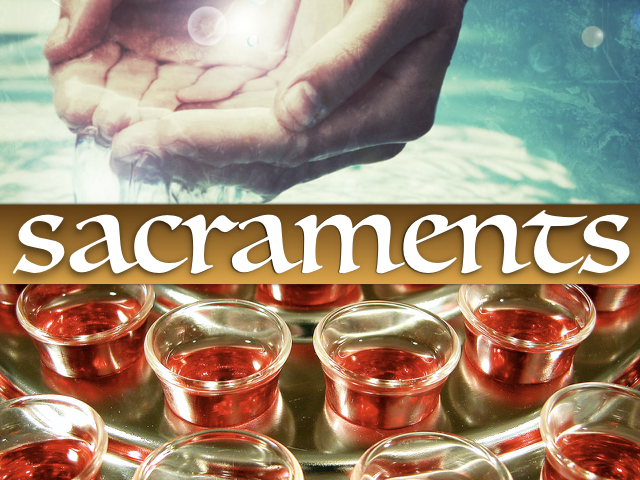- ORDINANCE
'ɔr.dɪ.nəns, 'ɔrd.nəns noun. Authoritative order or decree. - 2. Religious ritual; particularly one ordained by Christ.
- 3. What Evangelical Christians call sacraments.

When I talk about certain Christian rituals, I call them
These folks think of “sacraments” as a Roman Catholic word… and some of them are
What do they call Christian rituals then? Well Evangelicals could just call ’em rituals, but for some reason we never really wanted to; it makes us think of dead rituals, or dead religion, which they’re not. Somehow the word “ordinances” caught on. Or “holy ordinances.” ’Cause Jesus ordained them.
The two ordinances which Evangelicals tend to single out, are
Anyway. Communion and baptism are definitely ordinances… and you’ll find Evangelicals tend to also practice all the other sacraments the Catholics do. They just won’t call them sacraments. Or ordinances, ’cause they figure Jesus didn’t ordain them. Although often the apostles did.
| CATHOLIC SACRAMENT | EVANGELICAL EQUIVALENT | WHO ORDAINED IT |
|---|---|---|
| Baptism | Baptism | Jesus |
| Confirmation | Confession of faith at baptism | Peter |
| Eucharist | Holy communion | Jesus |
| Penance | Counseling, confession, and intercession | James |
| Anointing the sick | Anointing the sick | James |
| Holy orders | Laying hands on people for ministry | The L |
| Matrimony | Wedding ceremonies | 9th-century Christians |
As you notice, Evangelicals still anoint and pray for the sick. Still lay hands on people they’re sending out to do ministry. Still perform wedding ceremonies, funerals, and baby dedications. Still counsel and
It’s all about “not doing as Catholics do,” even though we’re totally doing as Catholics do.
Well, there is some difference in belief.
Just a reminder: When it comes to sacraments, there are three categories of Christian.
- SACRAMENTALISTS take sacraments seriously. (Sometimes literally.)
- NON-SACRAMENTALISTS think they’re important, but not mandatory; they do them, but they don’t fret if they don’t do them.
- ANTI-SACRAMENTALISTS figure they’re dead religion and won’t do them at all.
Often the formal reason a church will call these rituals ordinances instead of sacraments, is because they are, they claim a non-sacramentalist church.
Fr’instance Jesus told his first apostles—and really, every Christian everywhere—to make disciples and baptize ’em.
- Sacramentalists would say that person has defied Jesus, and you’re not legitimately Christian if you refuse to follow Jesus.
- Non-sacramentalists would point out
we’re saved by grace andnot good works, and obviously baptism is a good work. The situation is far from ideal, but it’s hardly gonna endanger one’s salvation. - Anti-sacramentalists wonder why we’re even wasting time on this.
Same deal if someone refuses holy communion every time it’s offered. Sacramentalists are pretty sure such a person isn’t even Christian; non-sacramentalists are bothered by it, but would never say it undoes one’s salvation; and anti-sacramentalists (assuming they even do holy communion) don’t know why you’re making such a big deal out of somebody skipping snack time.
But from time to time, you’re gonna find out a “non-sacramentalist” church actually is sacramentalist. Talk to one of its leaders about the scenarios I just mentioned: Someone who deliberately skips baptism, or somebody who deliberately skips holy communion. And surprisingly often you’ll find the leader says the very same thing the sacramentalist does: “Why in the world would a true Christian avoid these things? I’d seriously wonder about their salvation.”
I myself am sacramentalist, so I’m right there with ’em. Jesus ordained them, so we should do them, period. If you’re not gonna do them, same as if you’re not gonna follow Jesus’s other commands and instructions, you can’t legitimately call yourself Christian. Christians follow Jesus—again, period. Defying Jesus doesn’t undo salvation so much as reveal somebody who isn’t actually a Christ-follower.
So why do these folks call themselves non-sacramentalists, when actually they do think Jesus’s holy ordinances are mandatory? Usually because they don’t believe as Catholics, and
Catholics, fr’instance, take holy communion literally. They believe the wafers and wine become Jesus. Not just represent Jesus; during the service they literally become Jesus. Their molecules get swapped with Jesus’s. (The technical term for it is
I’m not Catholic; I don’t believe the communion elements are literally Jesus. Neither does my church tradition, nor my church. This doesn’t mean we therefore don’t believe in communion; we totally do. We just don’t buy transubstantiation. We figure the wafers, flatbread, saltines, matzo, oyster crackers, bread pellets, or whatever your church uses, only represent Jesus and nothing more. Our Lord is a big fan of metaphors!
Other Protestants figure Jesus’s presence is in the wafers somehow. But whenever Evangelicals feel like making fun of other Christians’ beliefs, we never mock those believers; we head straight for the Catholics. Seems it’s the only interpretation of the scriptures where
But the reason certain Evangelicals object so strenuously to Catholic beliefs… is because deep down, they’re sacramentalists. They take our rituals seriously! A non-sacramentalist wouldn’t; to them it shouldn’t matter how we do ’em. If the church pantry is out of bread and wine, but it has Cheez-its and Capri-Suns, they could swap ’em and do the ritual anyway. Sounds tacky, but they’d figure the point is we’re trying to remember Jesus’s self-sacrifice here. That’s the important part, right? But to a Protestant sacramentalists, Cheez-Its and Capri-Suns are unacceptable. This ritual is important. It’s gotta be done properly. Reverently. Thoughtfully. Carefully. Worshipfully. We’ve gotta follow what the scriptures teach (as far as we can deduce) and do them in the right spirit.
As for the reason Evangelicals nitpick and condemn variant beliefs, it’s generally because we don’t do grace. God does—if we get something wrong, or mix something up, he can work around that. We won’t. Evangelicals condemn Catholic beliefs because these Evangelicals have and hold old grudges, and fall back on that. Not on understanding one another, nor loving one another as sisters and brothers in Christ. It’s bile disguised as religion. Or as Jesus calls it,
’Cause the “ordinances” count.
The churches I grew up in, called ’em ordinances. But like I said, it was very important how we did the ordinances. For all of them, baptism was full immersion: You went all the way down into the water. Anything less wasn’t a valid baptism. When I was baptized in the Catholic church as an infant, the priest poured water over my head, so that definitely didn’t count as far as they were concerned. But when I was baptized again at age 7, they definitely immersed me, so that counted.
Now, to a true non-sacramentalist, it makes no difference. Immersion or pouring water: It’s all baptism. Getting baptized as an unaware baby, or getting baptized as a conscious believer: It’s all baptism. Getting baptized in a baptismal, a river, a tub, the fountain outside City Hall, or running through a sprinkler: It’s all the same to them. The important thing is we remember our salvation, right?
When I describe a real non-sacramentalist point of view to an Evangelical, they wanna know what kind of strange hippies I’ve been hanging out with again. Sounds way too theologically libertarian for them. There oughta be some boundary lines drawn around what these ordinances oughta mean, and look like.
Why? Obviously, they respond, because they count.
Count to whom; us? No, they respond, to God.
Well that’d be sacramentalism. If they count to God—if he expects us to do them, and do them with a serious state of mind because they represent something valid—it means God’s done, doing, or gonna do something which corresponds to our ritual. It’s not an empty ritual. It’s full. It’s more than a mere ordinance. It’s a sacrament.


